
From the Website of CNN NEWS
links: https://edition.cnn.com/2020/03/19/health/us-coronavirus-case-updates-thursday/index.html
(CNN)The federal government is preparing for the possibility the coronavirus pandemic could last up to 18 months or longer and "include multiple waves of illness," a report obtained by CNN shows, as the number of the cases in the US surpassed 10,000.
While the document does not say the Trump administration believes the pandemic will last that long, it indicates officials have to assume a longer timeline to ensure preparedness.
The plan also outlines the risks posed by a shortage of medical equipment -- an issue hospitals are already dealing with as the outbreak in the US shows no signs of slowing.
More than 2,700 new cases were reported in the US in the 24 hours from Wednesday morning to Thursday morning. In total, more than 10,200 people across the country have tested positive for the virus, as of late Thursday morning. At least 152 have died.
Those numbers continue to increase as testing becomes more available. In New York state, almost 8,000 tests were done overnight, Gov. Andrew Cuomo told CNN's Alisyn Camerota on Thursday morning. Officials later announced the state had 4,152 confirmed cases.
"When you do 8,000 tests," the governor said, "the numbers are going to go up exponentially."
The US government announced this week it would help make up for potential medical supply shortages and deploy two hospital ships to help increase medical capacity.
"I view it as, in a sense, of wartime president," President Donald Trump said in a news conference Wednesday. "I mean, that's what we're fighting. It's a very tough situation here."
To slow the spread of the virus, governors across the country sprang into action this week,
implementing drastic measures such as shutting down schools, transitioning bars and restaurants to only take-out services and putting a ban on mass gatherings.
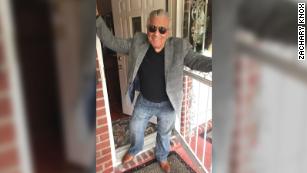 |
| A former firefighter and a retired magician are among people who've died from coronavirus in the US |
Some city leaders in California -- including San Francisco's Mayor London Breed who was the first to enact such a policy -- have instructed their residents to"shelter-in-place" and leave their home only if absolutely necessary.
About 10 million residents are under such an order. Solano County, the latest to join other Bay Area counties in implementing it, told residents to stay put until April 7.
"We are taking this health crisis seriously and trying to protect our community while still ensuring that the essential parts of our county can function and attempting to lessen the substantial burden placed on workers and businesses," Dr. Bela Matyas, Solano County public health officer said in a statement.
But in many communities across the US, that burden has proved massive, with some hospitals saying they are down to days' worth of equipment.
Sewing masks together
In southwest Georgia, hospitals are left with three days' worth of masks, Scott Steiner, President & CEO of Phoebe Putney Health Systems told CNN.
"We have gone through five months, now six months' worth of supplies in less than a week," he said. "And we are scrambling."
"This is surgical sheeting, and this is our prototype," he said. "We have about 3,000 of these made. We believe we can make 200,000 of them. It will take a few weeks, but this is kind of what we're having to do because we don't know when the next shipment is coming."
Similar stories of DIY supplies have been pouring in from across the country.
"We literally were down to under half a day's worth of personal protective equipment," Dr. Amy Compton-Phillips, the chief clinical officer and executive vice president of Providence St. Joseph Health, a system of more than 50 hospitals that provides services across seven US states, said Wednesday. "We've been virtually desperate, looking under every nook and cranny, trying to find the equipment we need. "
Typically, she says, those hospitals together go through 250,000 masks a year. In three months this year, a single hospital has gone through the same amount.
"So the increased demand has just far outstripped supply," Compton-Phillips said. So hospitals are resorting to making their own equipment.
"We're actually going to put out (a) 100 million mask challenge with plans on how to build the masks as well as design so you can make it at home. Because we need to do something. And we know the global supply chain is just tied up right now," she said.
State measures to combat shortages
In King County, Washington, which saw one of the first cluster of outbreaks in the US, officials said Wednesday they are setting up a temporary hospital in a soccer field.
The field would give the county an additional 200 medical beds. Health officials have estimated a need of about 3,000 more beds for the country.
"This is a rapidly evolving situation that requires quick and decisive action," a news release from the city of Shoreline, Washington, says. "The county is moving to address the growing need for hospital beds in the region (and) is currently in the process of setting up the tents and other infrastructure in preparation."
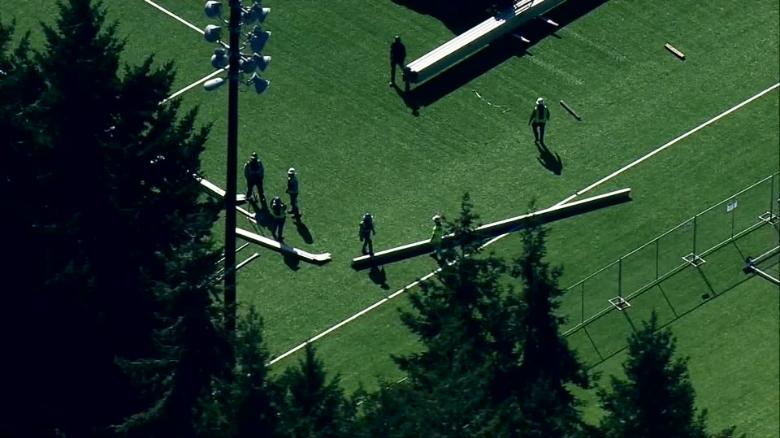
Health officials in Washington state said they would be setting up medical beds in a soccer field.
In Maryland, health officials are working to up their medical beds by at least 6,000.
"We're concerned about issues like hospital beds, capacities, dealing with things like personal protective equipment and ventilators and all those things," Maryland Gov. Larry Hogan said Wednesday. "Every single governor is taking independent actions that they believe are necessary to save the lives of people in their states, unprecedented actions that we're all taking."
In New York, Gov. Cuomo said the virus should peak in 45 days and asked for an additional 110,000 beds.
"They all talk about flattening the curve," he told CNN's Chris Cuomo earlier this week. "I don't see a curve. I see a wave. And the wave is going to break on the healthcare system and ... it is going to be a tsunami."
The state already has a capacity of 3,000 ventilators but Cuomo says that's not nearly enough.
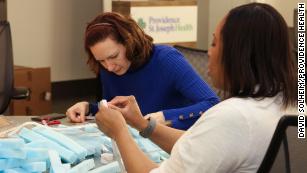 |
| Hospitals and doctors offices battling coronavirus are running out of protective gear, so some are making their own |
Meanwhile, with an abruptly heightened demand of ventilators, manufacturers say it's hard to keep up.
"It is more than we can currently provide," said Kathrin Elsner, team leader of MarCom Ventilators at Hamilton Medical Inc. Elsner said the company has already received hundreds of orders and requests within the past few weeks.
Smaller, rural hospitals across the United States -- which often have no more than 25 beds and just one ventilator -- might be forced to transfer patients to larger facilities if they see a surge in cases.
"That is rural America," said Alan Morgan, chief executive officer of the National Rural Health Association. "You have a high proportion of low-income, elderly people with high health needs. So if you were to have a cluster in a rural community it would turn bad quickly."
Officials call on younger generations to heed guidance
In recent days, officials have emphasized the role younger populations may play in how the virus spreads.
 |
|
|
"It may have been that the millennial generation,... there may be a disproportional number of infections among that group," Dr. Deborah Birx, the White House Coronavirus Response Coordinator said Wednesday, calling on younger people to heed guidance from officials.
People should not continue to socialize in large groups, she said. "You have the potential then to spread it to someone who does have a condition that none of us knew about and cause them to have a disastrous outcome."
Recent studies and an outbreak in Massachusetts have pointed to the fact that infected but asymptomatic residents may be driving the spread of the virus more than health officials realized.
CNN Website
Article Links
OTHER HUMAN RIGHTS PROMOTIONS WEBSITES
------------------------------------------------------------------------------------------------
THE GLOBAL WORLD PROMOTIONS
-------------------------------------------------------------------------------------------------
-------------------------------------------------------------------------------
---------------------------------------------------





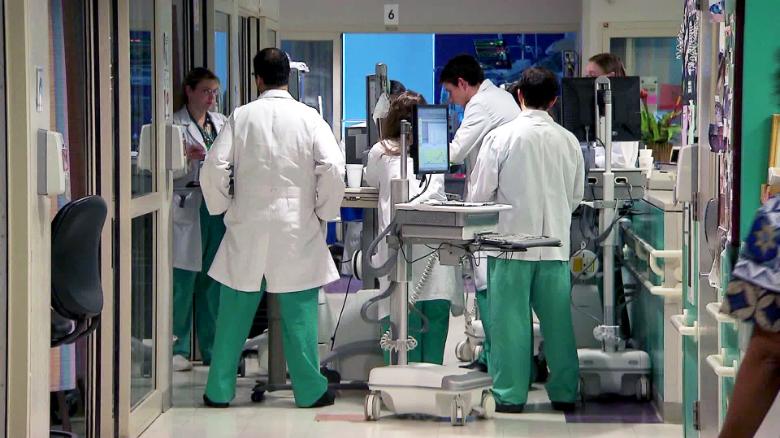
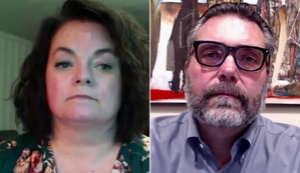






























0 comments:
Post a Comment